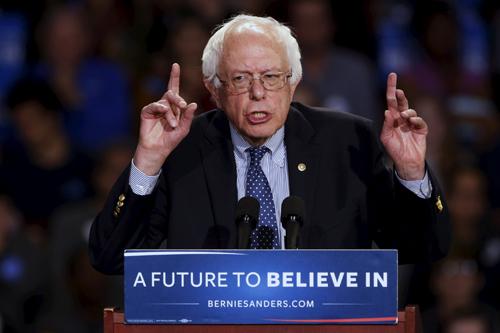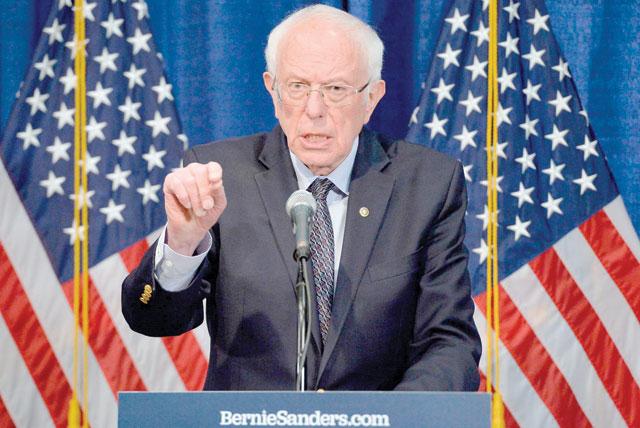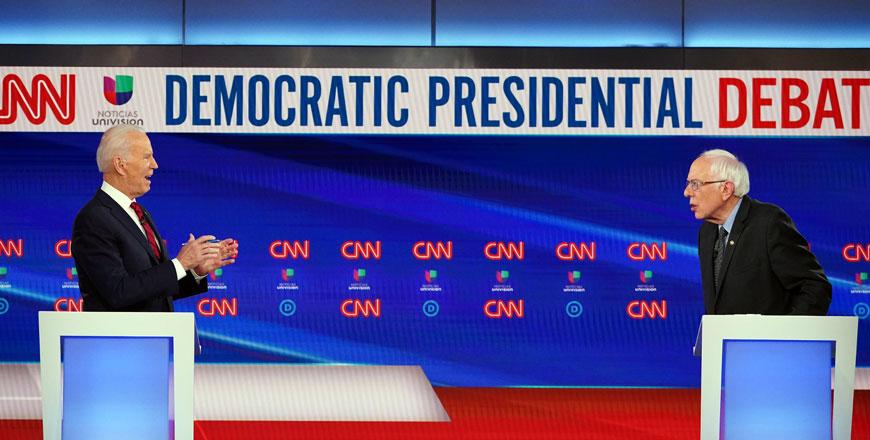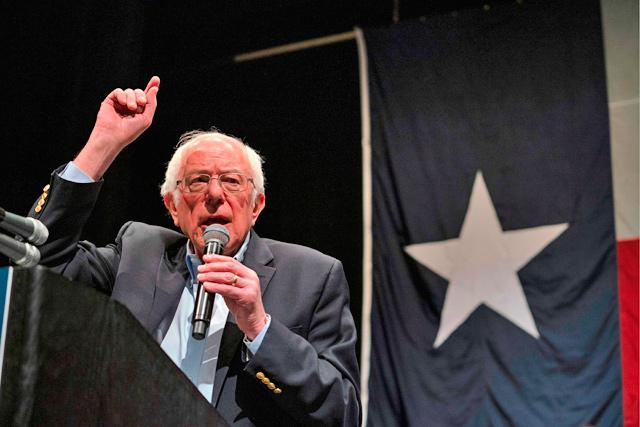You are here
Europeans see something familiar in odd US primary race
By AP - Feb 22,2016 - Last updated at Feb 22,2016

US Democratic presidential candidate Bernie Sanders delivers remarks to supporters at an arena in Greenville, South Carolina, on Sunday (Reuters photo)
LONDON — With its red, white and blue banners, patriotic slogans and ubiquitous country songs, the presidential campaign marching through South Carolina and Nevada seems like an all-American affair. But it holds familiar overtones for Europeans watching anxiously from abroad.
Donald Trump — his bombast distinctly American — sometimes takes a nationalist stance that sounds a lot like the "blame the immigrant" approach used by a growing cadre of European politicians as the continent deals with unprecedented waves of immigration and extremism.
On the left, Bernie Sanders espouses Scandinavian-style "democratic socialism" that sounds radical to some American ears. But it has long been part of the political mainstream in Europe, where socialist governments come and go without particular fanfare.
The sentiment fueling the unexpected ascent of Trump and Sanders seems the same as the mood powering trends in Europe: a flat-out, let's-make-a-change rejection of the political elite.
Jacek Kucharczyk, president of the Institute of Public Affairs in Warsaw, says despite huge differences between politics in Europe and the United States, the same sense of grievance and helplessness is driving people to extremes on the left and the right.
He cites the Polish election in October that brought the anti-immigrant Law and Justice Party led by Jaroslaw Kaczynski to power. "There is the same mistrust of the political mainstream. There is this lethal combination of social economic uncertainties and identity wars that are imposed on them," he says.
Fear of mass immigration is a common denominator that was exploited by Kaczynski in the final stages of his campaign — when he warned that the migrants arriving on Europe's shores were carrying dangerous infectious diseases — and Trump is stoking somewhat similar fears in the United States.
"When we hear Trump, it really sounds like Kaczynski," says Kucharczyk.
In both Europe and the US, extremist attacks also have undermined the sense of security, heightening fears of outsiders.
Attacks have been far more frequent and lethal in Europe, which is relatively close to the Daesh terror group's bases in Syria and Iraq. And Europe has been rattled by the arrival last year of more than 1 million immigrants, many fleeing Middle East conflict.
But the December attacks that killed 14 people in San Bernardino, California, had a noticeable impact on the American psyche. It may have caused a bump in support for Trump, just as backing for anti-Islamic European lawmakers like the Netherlands' Geert Wilders appears to have grown since the extremist attacks in Paris and elsewhere.
Trump alarmed many overseas observers, by classifying some Mexican immigrants as rapists and suggesting a temporary ban to keep Muslims from entering the United States.
Josef Braml, a specialist with the German Council of Foreign Relations, says the venomous attack style surfacing in the US primary campaign is calculated to capitalise on anger with a political class that can no longer be counted on to provide security, job growth and economic expansion.
"They are saying, 'To hell with political correctness, I'm telling you the truth,'" he says. "That tells me they see political correctness as the code of the elite.
He sees resurgent nationalism, fed by fear of outsiders, in both the United States and in Europe, where many felt it had faded as a political force. Trump's disparagement of Mexicans is similar to the anti-Semitic views expressed by the National Front in France, he says.
While Trump's rise is surprising to many Europeans, the strong early performance by Sanders in his bid to snatch the Democratic Party nomination from Hillary Clinton is not setting off alarm bells because his views are similar to those expressed by left-wing politicians in Europe for generations.
Indeed, some trace the roots of his socialism to the world his Jewish father inhabited in Poland before he left for the United States and settled in Brooklyn in 1921.
Sanders' call for free college tuition at public colleges and universities, for example, puts him squarely in line with policies already in effect in a number of prosperous European countries including Sweden and Norway.
His attacks on Wall Street and its bankers would also get a careful hearing in Europe, where even the rightist Law and Justice Party in Poland has complained about inequality and imposed new taxes on banks, with the same medicine planned for large supermarkets.
There are parallels between Sanders' bid for supremacy in the Democratic Party and Jeremy Corbyn's ultimately successful campaign for the top spot in Britain's Labour Party even though mainstream party leaders found him too far to the left for their taste.
Sanders' rise has been cheered by European leftists including many in Scandinavia with deeply held anti-American views, says Mads Fuglede, a Danish historian and political commentator.
He says, "They see the US as a capitalist nightmare, so when someone says they want to make a revolution against free market capitalism, they embrace that, so he has a lot of fans."
What does all this say about Trump and Sanders?
"The two are really significantly different but you can unite them by saying anti-elite sentiment coming from the left and from the right is gaining ground," said Dominique Moisi, senior adviser to the French Institute of International Relations. "We have not seen that in American elections before."
Related Articles
BURLINGTON, United States — Bernie Sanders on Wednesday shrugged off a string of primary defeats and pressure to drop out of the race for th
WASHINGTON — White House hopefuls Joe Biden and rival Bernie Sanders launched a joint attack on Donald Trump's response to the coronavirus p
LAS VEGAS — Bernie Sanders' landslide victory in Nevada's Democratic nominating contest has scattered his moderate challengers and injected



















